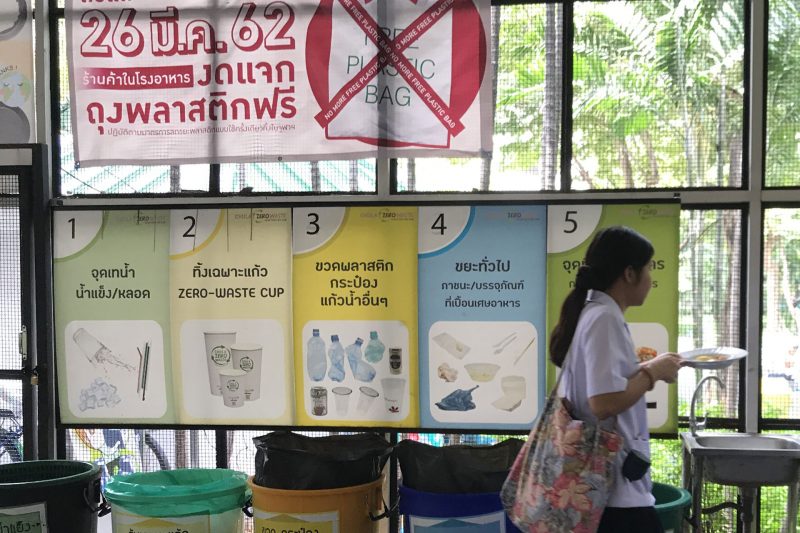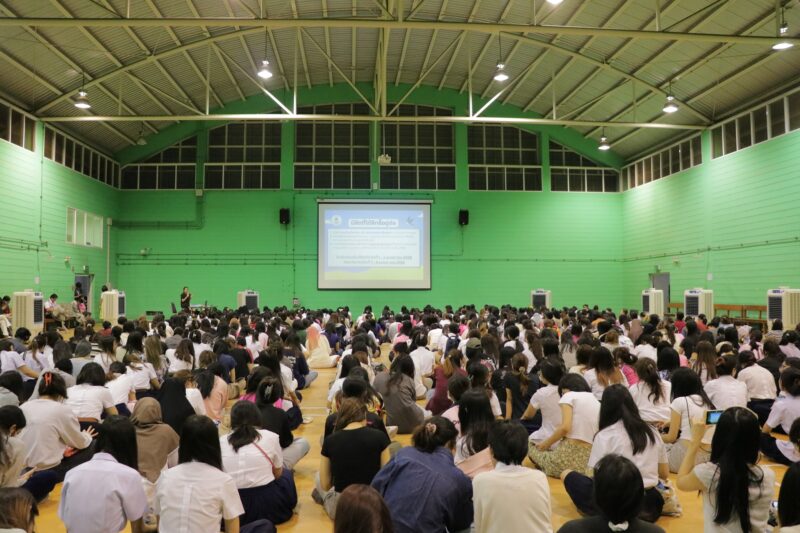Chulalongkorn University’s Building Improvement and Technological Developments to Enhance Energy Efficiency and Conservation
Photo by Matthew Henry on Unsplash
Chulalongkorn University places great importance on energy efficiency and conservation across all aspects of its operations. This commitment is reflected in the University’s continuous implementation of plans and projects to upgrade existing buildings for higher energy efficiency, in accordance with the principles of green building development and sustainable energy management.
The University has conducted surveys and assessments to identify and prioritize buildings for renovation, integrating energy-saving technologies such as high-efficiency lighting systems, intelligent energy management systems, and real-time energy monitoring tools. These efforts are part of a long-term plan to transform all university buildings into energy-efficient facilities.
4 Strategic Plans and Actions to Enhance Building Energy Efficiency
1. Establishing University-Wide Energy Conservation and Management Policies
Chulalongkorn University has formulated the Chulalongkorn University’s Sustainable and Efficient Energy Management and Conservation Policy [ http://www.sustainability.chula.ac.th/th/rule-regulation/3697/ ] to serve as a guideline for all faculties and administrative units. The policy, overseen by the University’s central management body, ensures that each unit adopts concrete measures to manage energy use systematically and effectively.
The policy aims to enhance energy efficiency, reduce dependence on fossil fuels, lower greenhouse gas emissions, and minimize environmental impacts. It provides specific guidance on the design and renovation of university buildings in compliance with the Building Control Act and ministerial regulations on energy conservation in building design.
The University also adopts standards from the Thai’s Rating of Energy and Environmental Sustainability (TREES) developed by the Thai Green Building Institute, to promote reduced energy consumption, improved efficiency, and sustainable environmental stewardship.
Chulalongkorn University’s Sustainable and Efficient Energy Management and Conservation Policy
2. Installation of Rooftop Solar Photovoltaic Systems
Chulalongkorn University is transitioning from traditional energy systems to zero-carbon renewable energy sources, particularly solar power (Solar PV Development). Given the University’s location in the heart of Bangkok and the limited availability of land, rooftop solar energy has proven to be the most suitable renewable energy solution for the campus context.
The University has signed an agreement with the Metropolitan Electricity Authority (MEA) to implement the Chulalongkorn University Solar Cells System Project, managed by the Office of Physical Resources Management. The project aims to install rooftop solar systems on 62 buildings across the campus with suitable potential for solar generation.
The project follows a structured process:
- Rooftop survey – identifying optimal locations for solar panels based on sunlight direction and building safety.
- Preparation of installation sites – reinforcing structures to ensure load-bearing capacity and optimal light exposure.
- Panel installation – orienting panels east and west to minimize midday heat and optimize daily energy production.
- Monitoring and evaluation – continuously measuring solar irradiance and energy output to assess daily performance.
As of 2025, installations have been completed on 32.25% (20 buildings), are in progress on 20.97% (13 buildings), and under contract preparation for 46.78% (29 buildings).
“Upon completion, the system will be capable of offsetting up to 25% of the university’s total electricity consumption.”
Between 2024–2025, the project has reduced electricity costs by over 4.57 million THB and generated more than 3.57 million kilowatt-hours (kWh) from installations within the academic zone, the MEA pilot area, and the Sandbox zone operated in collaboration with external partners such as MEA and GULF.
This initiative not only reduces electricity expenses but also significantly cuts carbon dioxide emissions. Since every 1,000 kWh of solar energy can reduce approximately 0.6 tons of CO₂, the University’s solar generation of over 3.5 million kWh is estimated to reduce more than 2,100 tons of CO₂ annually, equivalent to planting over 210,000 trees. Thus, Chulalongkorn University stands not only as a leader in academic excellence but also as a model for sustainable development and environmental responsibility.
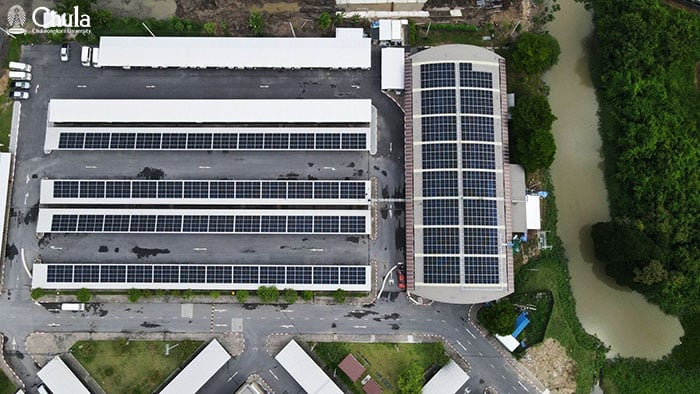
Additionally, the University emphasizes green building design in all new constructions — optimizing building orientation and layout for natural light utilization to reduce energy consumption.
3. Electrical Equipment Lifespan Inspection and Efficiency Assessment
Chulalongkorn University regularly inspects and evaluates the performance of electrical equipment to replace them with energy-efficient alternatives in all central buildings. Equipment such as lighting and air-conditioning systems are inspected every six months.
The University also upgrades its HVAC systems by installing monitoring devices to track system heat levels and improve ventilation and cooling performance. Furthermore, Chulalongkorn has implemented the CU BEMS (Building Energy Management System), an intelligent platform that monitors, controls, and manages energy use efficiently across campus buildings.
Through a web application and centralized dashboard, CU BEMS provides real-time data on peak load and carbon emissions, enabling targeted energy reduction. The system was developed by the Smart Grid Research Unit (SGRU), Department of Electrical Engineering, Faculty of Engineering, Chulalongkorn University, in collaboration with The University of Tokyo and several domestic and international industry partners, with funding from the Energy Conservation Promotion Fund (ENCON Fund) of the Ministry of Energy.
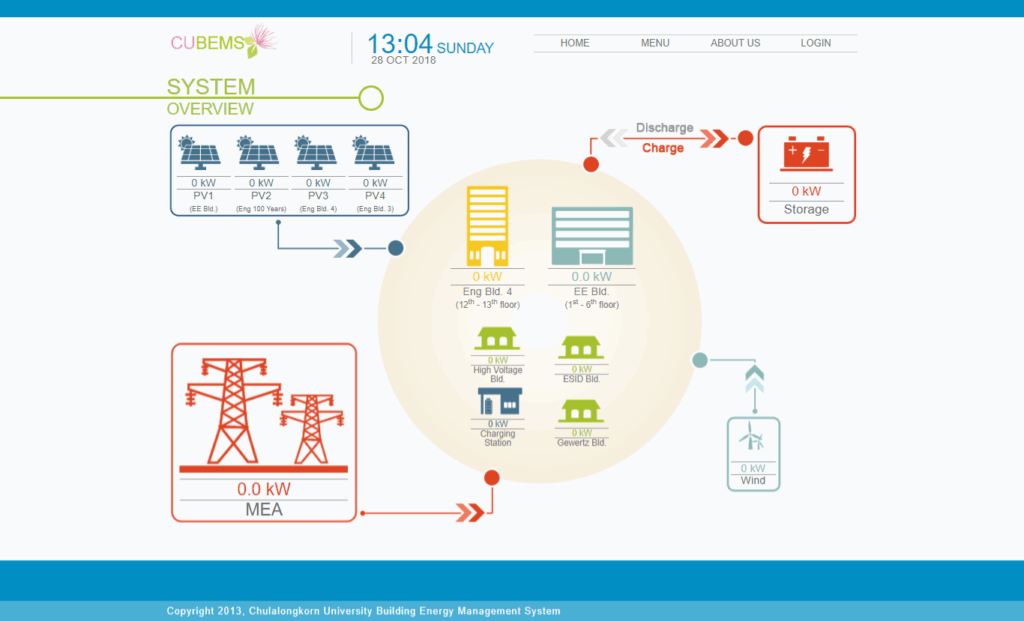
[ https://www.sgru.eng.chula.ac.th/cu-bems/ ]
4. Development of the CU Smart City Platform
The Energy Research Institute (ERI), Chulalongkorn Universityrecognizes that sustainable smart city development in Thailand requires a unified, open platform capable of collecting and managing urban data comprehensively.
To this end, the University initiated the CU Smart City Platform, which serves as a testbed for developing, testing, and demonstrating smart urban technologies under the vision of “SMART 5.” The project primarily focuses on smart energy management systems and related smart systems that support efficient energy use.
Researchers have installed sensors, meters, IoT devices, and intelligent control systems to enhance environmental sustainability — particularly solar energy generation — and optimize building electricity demand.
In addition to smart energy management, the CU Smart City Platform integrates smart environment, smart mobility, and smart security systems, promoting data connectivity across various domains to form an intelligent and sustainable campus community.
Launched in late 2023, the project aims to establish Chulalongkorn’s comprehensive smart university platform encompassing:
- SMART ENERGY – intelligent energy management
- SMART ENVIRONMENT – environmental monitoring
- SMART MOBILITY – intelligent transportation systems
- SMART SECURITY – safety and surveillance integration
- SMART COMMUNITY – community communication and engagement
The goal is to achieve 100% data integration across all units within the academic area, enabling precise monitoring, planning, and energy optimization.
As of 2025, the platform is fully operational and provides real-time energy monitoring and data visualization for major university areas, supporting informed energy management decisions.
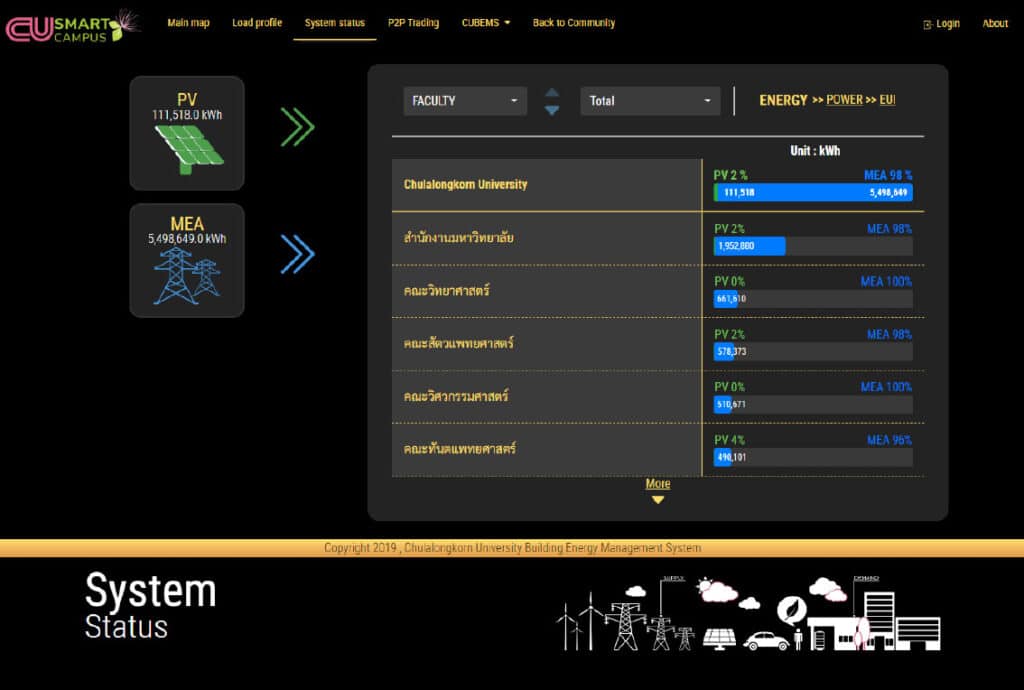
[ https://ls.ene.cusmart.chula.ac.th/#/home/system-snapshot ]
By
- Office of Physical Resources Management, Chulalongkorn University
- Faculty of Engineering, Chulalongkorn University
- Energy Research Institute, Chulalongkorn University
Others

